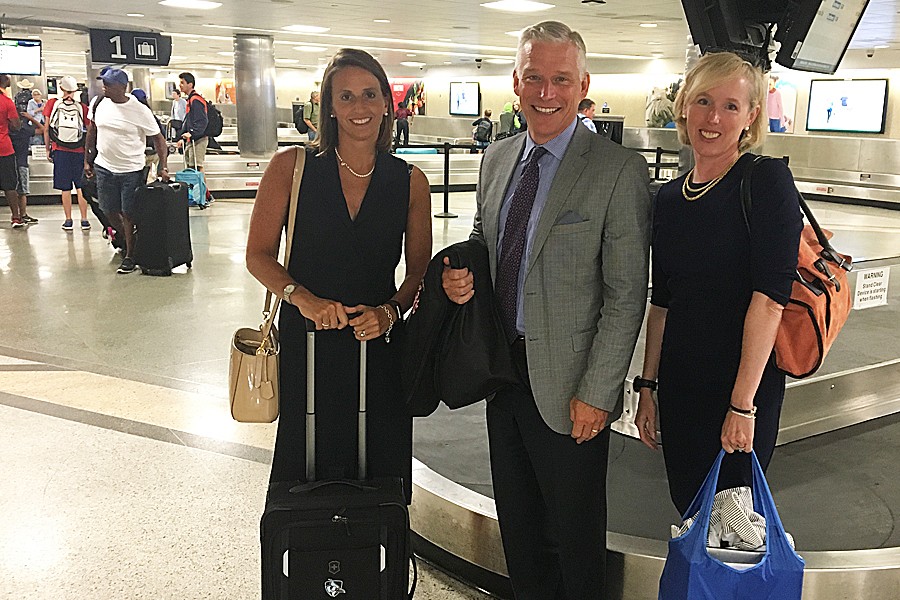Traveling on business doesn't have to be grueling. The right preparation can make or break a trip—from packing the perfect carry-on to getting a good night's sleep. Years of experience have taught these Johns Hopkins faculty and staff members how to stay sane on the road, and now their secrets can be yours, too.
Keep healthy habits
We've all been there—after rushing to the airport and a long morning of travel, you're subsisting on coffee alone, and your stomach is growling. Although it may be tempting to stop at a fast food joint or dig into the hotel buffet, experienced travelers have learned they will regret those choices later on.
"Sorry, the all-you-can-eat muffin display should be left alone," says Maureen Marsh, secretary of the Johns Hopkins University board of trustees. "When you are on vacation, have the dessert or dip into the bread basket, but when traveling for work, eat as you do at home."
Tackle hunger pangs by keeping snacks on hand during busy days, and re-stocking at a local market or grocery store. "Small, portable snacks can really make or break your attitude and help stave off a food crisis," says Amy Brokl, senior associate director of development at Johns Hopkins. "Otherwise, you don't know what you'll have to turn to."
Learn to pack light
In her 14 years of traveling on the job with Johns Hopkins, Brokl has developed tried-and-true strategies to stay sane and enjoy the process. The first step, she says, begins at home: packing light.
"I avoid carrying a bag that I can't lift easily," says Brokl, who counts a small duffel as her go-to bag. To make the most of its space, she rolls her clothes, uses packing cubes, and invests in travel-size versions of her favorite toiletries. The carry-on suitcase's material and construction matter, too. A duffel's soft sides and compact form allow it to squeeze into small spaces in crowded overhead bins where a hard-sided rolling carry-on wouldn't fit.
Marsh, who travels across the country working with trustees, has also found benefits in lightening her load while traveling. "If you pack light, you don't have to check luggage, and you can run to catch a train easily," she says.
Planning outfits in advance helps Marsh avoid overpacking. "Know what meetings, dinners, and activities you have, and pack outfits accordingly," she advises.
Her biggest trick, though, is packing clothes in Ziploc bags. "It maximizes space in your luggage, and keeps clothes clean and less wrinkled," says Marsh, who has packed 10 days of clothes into a carry-on with this strategy. Another pro tip: Most drycleaners will fold shirts for no additional charge.
Patricia Davidson, dean of the Johns Hopkins School of Nursing, streamlines her travel wardrobe by coordinating items around a color scheme. "Black is good—it takes you from day to night," she says. Extra points to pieces that can serve double-duty. "A black cashmere pashmina is invaluable. It's much lighter than a coat and a good blanket when stranded."
If you do check a bag, make sure you pack first-day necessities (a change of clothes, medications, and any business materials) in your carry-on in case of lost luggage, Davidson advises. "Assume you can survive without most things you check," she adds.
Embrace technology
"Leverage the technology that's available—so many new tools have emerged over the past five years," Brokl says. Apps such as TripIt organize travel confirmations into one master itinerary and eliminate the need to carry paper documents. Its sister app, PackPoint, tells you what to bring based on your length of stay, activities, and weather conditions. To reduce weight, Brokl recommends downsizing tech to the smallest items that will fit your working needs, such as a tablet or lightweight laptop.

Image caption: Alain Labrique, director of the JHU Global mHealth Initiative, traveling in Dubai in January
There's an app for everything from exercising on the go (Fritz Schroeder, the university's vice president for development and alumni relations, uses Runkeeper to discover and save running routes in new cities) to international calling and messaging (try WhatsApp or FaceTime) and getting a good night's sleep (such as the ambient sound app White Noise).
Alain Labrique, director of the Johns Hopkins University Global mHealth Initiative, says that investing in an unlimited global data plan keeps him sane on multiweek trips to research field sites in sub-Saharan Africa and East and South Asia. "Wherever I am, I don't need to worry about using my phone to make calls over Skype, access maps, or look up information. On a recent trip, I was able to identify alternative flights when my plane was canceled, and rebook a new itinerary, all on my smartphone."
And when you don't know where you may get your next charge, battery life is crucial, he adds. "I have a 20,000 milliamp battery pack, which can recharge my phone three to four times, and an extended battery on the phone itself, which allows me to keep on going for hours without a wall socket."
Reduce uncertainty, reduce stress
Frequent fliers can benefit from membership in programs such as TSA Pre Check, which helps verified travelers speed through security, and, for international travelers, Global Entry, which offers expedited clearance through U.S. Customs.
Something as simple as sticking with a single airline offers benefits, too. Racking up frequent flier loyalty points until you reach a premier status comes with rewards such as priority check-in and access to lounges. "Even if I fly the cheapest economy ticket, I can go to the first class check-in," says Marina Piccinini, a virtuoso flutist on the faculty of the Peabody Conservatory, who lives in Vienna, Austria. Through her Star Alliance membership, Piccinini can get rewards from 28 airlines around the world. "That changes everything. It's really important to have that kind of special care when you're doing these mundane things."
Piccinini arrives at the airport early and gets away from the noise in a lounge or airport restaurant. On monthly trips to teach at Peabody, she relies on her favorite car service, Watkins Transportation, to get her to and from the airport. "I land at Dulles Airport, and he's right there to pick me up," Piccinini says. "I don't have to worry about anything. If there's a snow storm, he picks me up in his SUV. People taking care of you—that takes all the stress away."
Piccinini goes to great lengths to book a quiet hotel room away from potential noise, such as elevators or connecting doors. "I always stay at the same hotel in Baltimore, and they know which room I want and block it off for me. Being a frequent traveler has a lot of perks."
Despite the best efforts, though, traveling often means embracing the unexpected. "Remaining calm and collected is the key to happy traveling," says Labrique. "Nobody likes dealing with an angry, frustrated, complaining traveler—least of all, airlines staff." Although delays may cause minor headaches, such as missing a meeting or arriving at your destination a few hours late, "it's not the end of the world," he says. "I've come to see unexpected delays as a bit of a gift—a chance to explore a new place, meet local people, and try new food. At the very least, catch up on some of those backlogged emails."
Bring home along
After a while, the monotony of beige hotel rooms can wear down even the most enthusiastic traveler. "I admit that although it takes room in the suitcase, I pack things to make me comfortable," says Schroeder about his pillowcase and favorite shampoo and shaving cream. "Whatever it is that helps you feel comfortable after multiple hotels in as many days."
Schroeder also stays connected to home through a group text with his family. "I try to start and end each day on the road with a quick text to everyone," he says. "It feels good for all of us to stay in touch, and when my kids were younger, it reminded them that I started every day thinking about them, even from the road."
Working from rural destinations such as JiVitA, a Johns Hopkins research site in Gaibandha, Bangladesh, for weeks at a time, Labrique admits that staying connected to family back home is one of the biggest challenges. "I wish I had a surefire solution, but I don't. When you're dealing with 8- to 12-hour time differences, long workdays, and school schedules, finding the magic window when everyone can talk is nearly impossible," he says. Labrique uses Whatsapp or Facebook Messenger to communicate with his son and daughter, and speaks with his wife and young children before their bedtime, even if the time difference means waking up long before the sun rises.
For some, business travel and family time don't have to be mutually exclusive. Amit Peled, a faculty member at the Peabody Conservatory and a renowned cellist who performs across the globe, puts an emphasis on quality time with his wife and three children while at home in Baltimore during the school year. But when summer arrives, his kids and wife come along for the ride.
"For three months we're on the road," Peled says. "We've been doing it since [the kids] were born. They've been all over the world. They're trained to use a suitcase and passport."
Posted in Tools+Tech








